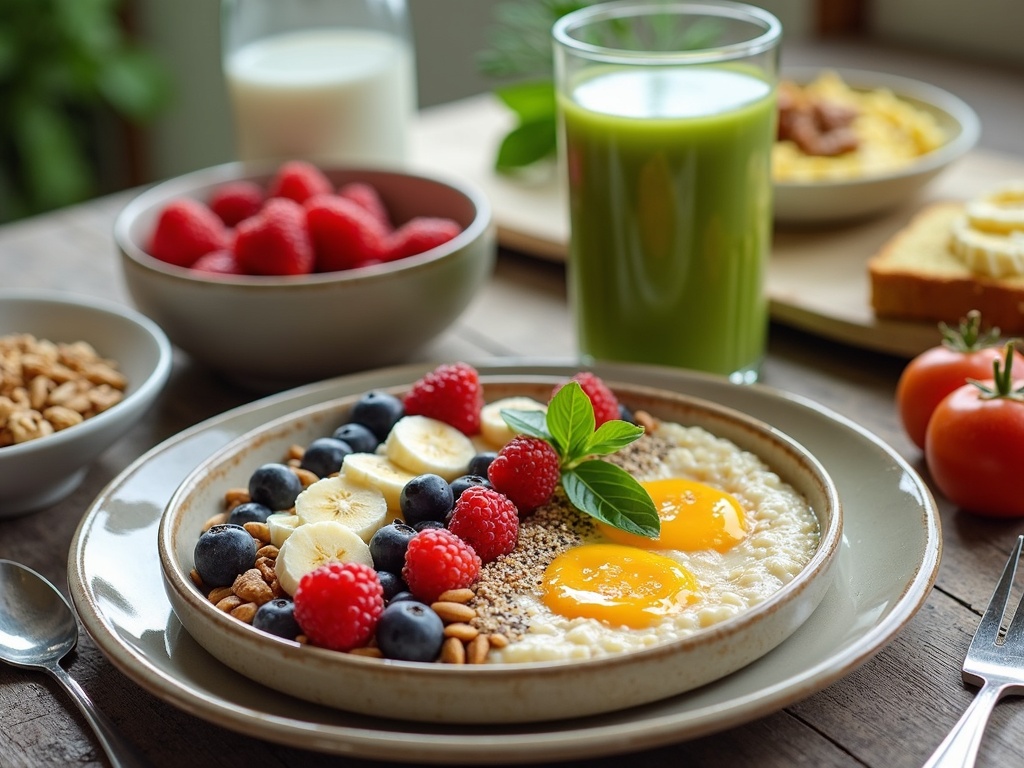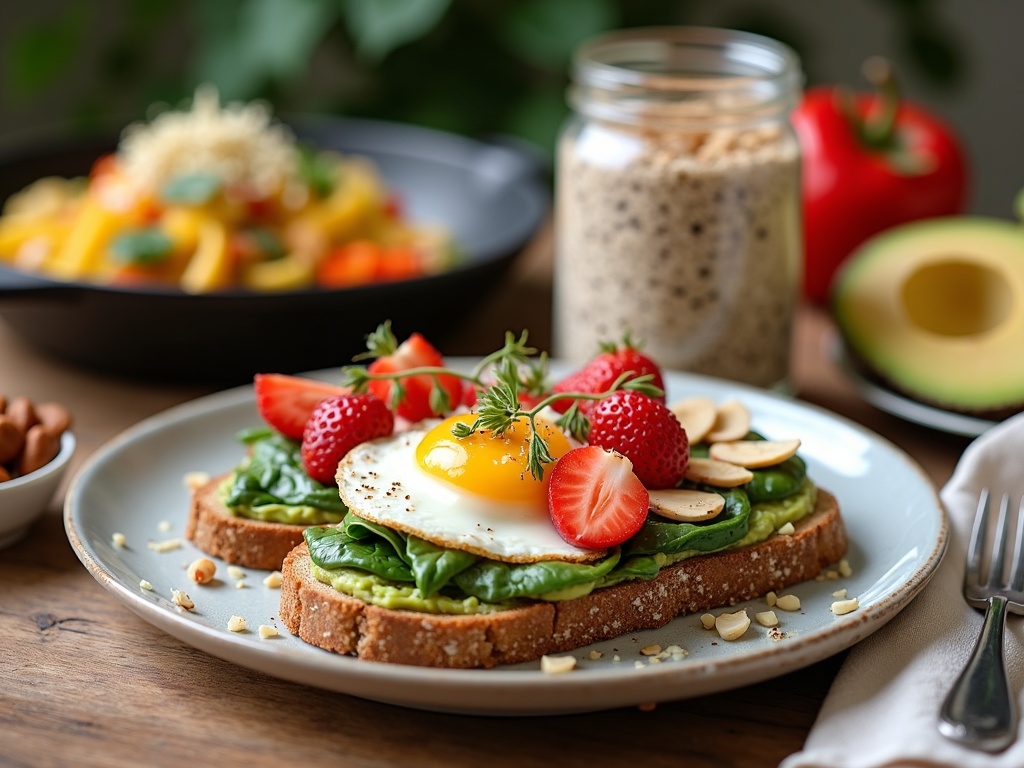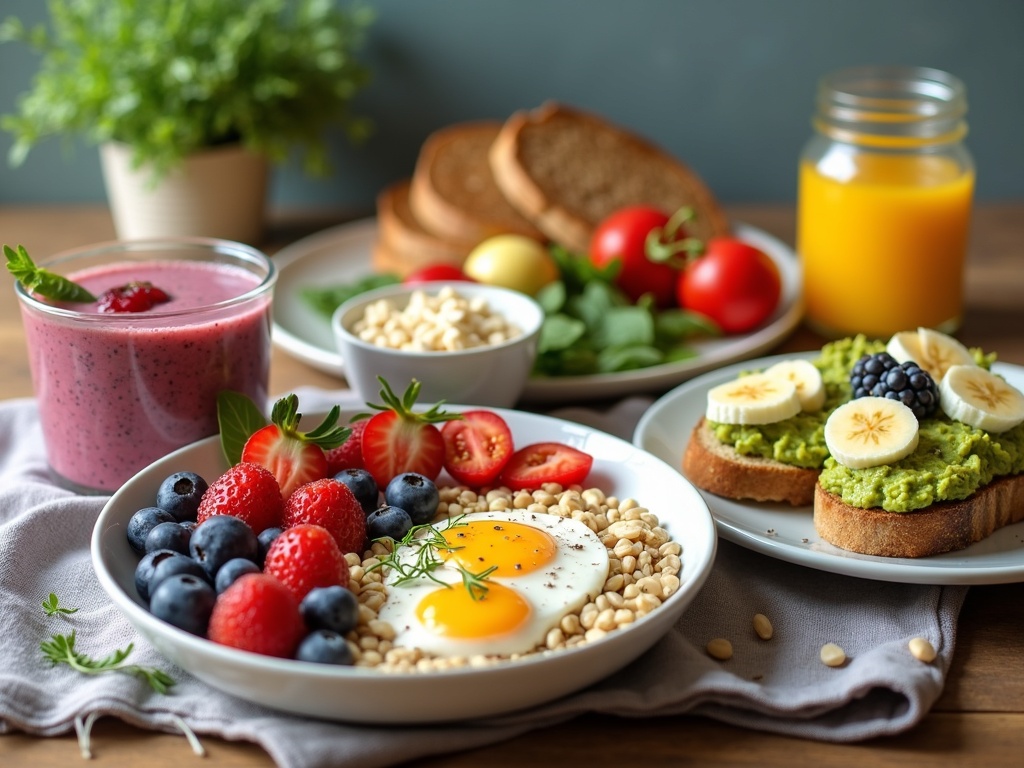A nutritious breakfast kickstarts metabolism and delivers key energy for peak brain function all day. Studies show that people who eat balanced morning meals have better focus, memory, and problem-solving skills while maintaining healthier weights than those who skip breakfast.
Find In This Article
Key Takeaways
- Breakfast should include a balance of protein, complex carbohydrates, and healthy fats to stabilize blood sugar and provide sustained energy.
- Regular breakfast consumption is associated with reduced risks of type 2 diabetes, heart disease, and obesity.
- Whole grains (oats, quinoa) and protein sources (eggs, Greek yogurt, nut butters) form an excellent foundation for a nutritious morning meal.
- Meal prepping components or complete breakfasts can save time while ensuring nutritional needs are met even on busy mornings.
- Adding seasonal fruits and vegetables to breakfast increases fiber intake, provides essential vitamins, and enhances the meal’s overall nutritional profile.
Why Your Body Needs a Morning Meal
I’ve discovered through years of examining eating patterns that breakfast truly sets the foundation for your entire day. Despite this, approximately 25% of adults regularly skip this crucial meal, unwittingly increasing their risk of obesity and chronic diseases.
Breakfast and Brain Power
Starting your day with a nutritious filling breakfast directly impacts your cognitive abilities. Studies show that people who eat breakfast demonstrate improved concentration, memory, and problem-solving skills compared to those who skip it. This mental boost happens because your brain receives the glucose it desperately needs after an overnight fast.
Your mood also gets a significant lift from morning nourishment. Ever notice how skipping breakfast makes you irritable? That’s your brain signaling its need for fuel. A simple nutritious breakfast stabilizes blood sugar levels, preventing those mid-morning mood crashes that can derail productivity.
Weight Management and Health Benefits
The CDC confirms that regular breakfast eaters maintain healthier weights over time. This might seem counterintuitive – eating more meals helps with weight management? The science checks out: morning meals kick-start your metabolism and help control hunger throughout the day, reducing the likelihood of unhealthy snacking and overeating at later meals.
For optimal benefits, nutritionists recommend making breakfast account for 20-30% of your daily caloric intake. This balanced approach provides enough energy without overloading your system. A high-fiber breakfast option keeps you satisfied longer while supporting digestive health.
The long-term health impacts of regular breakfast consumption extend beyond weight control:
- Reduced risk of type 2 diabetes through better blood sugar regulation
- Lower heart disease risk due to more consistent eating patterns
- Improved nutrient intake, particularly fiber, vitamins, and minerals
- Better overall diet quality throughout the day
I’ve found that many people who struggle with morning meals benefit from easy healthy breakfast ideas they can prepare quickly. Even something simple like whole grain toast with nut butter and fruit provides the essential nutrition needed to power your morning.
For those following plant-based diets, a healthy vegan breakfast delivers the same cognitive and metabolic benefits when properly balanced with protein, healthy fats, and complex carbohydrates.
The evidence is clear – investing time in healthy breakfast options pays dividends in improved brain function, better weight management, and reduced disease risk. Your morning meal isn’t just another eating occasion – it’s a powerful health intervention you can enjoy every day.
Power-Packed Ingredients for the Perfect Start
Starting my day with a nutritious filling breakfast isn’t just about quieting morning hunger—it’s about fueling my body with the right ingredients that provide sustained energy and essential nutrients. I’ve found that focusing on specific power ingredients makes a significant difference in how I feel throughout the day.
Whole Grains and Proteins: The Foundation Duo
Whole grains form the perfect base for any morning meal. Oats stand out as my go-to option because they’re packed with soluble fiber that helps maintain steady blood sugar levels. Whether prepared as overnight oats or a warm bowl of porridge, they provide lasting energy without the mid-morning crash. Quinoa offers a fantastic gluten-free alternative with complete protein content, while whole grain bread makes a quick foundation for toast topped with nutritious spreads.
Protein is equally crucial for a healthy breakfast option that keeps me satisfied. Greek yogurt delivers both protein and probiotics for gut health. Eggs remain one of the most versatile protein sources—scrambled, boiled, or in an omelet with vegetables. For plant-based options, nut butters like almond or peanut butter spread on whole grain toast provide protein along with healthy fats.
Colorful Fruits, Vegetables, and Healthy Fats
Adding fruits and vegetables to breakfast boosts its nutritional profile considerably. These power ingredients provide:
- Bananas for potassium and natural sweetness in smoothies or oatmeal
- Berries packed with antioxidants and fiber that complement yogurt parfaits perfectly
- Spinach that blends seamlessly into smoothies or omelets, adding iron and vitamins
- Avocados providing creamy texture and heart-healthy monounsaturated fats
Healthy fats deserve special attention in any easy healthy breakfast routine. I regularly incorporate nuts like walnuts and almonds, which contain omega-3 fatty acids and protein. Seeds such as chia, flax, and pumpkin seeds make excellent toppings for yogurt bowls or oatmeal, adding crunch and nutritional benefits. For those who enjoy savory breakfasts, fatty fish like salmon can be paired with whole grain toast for an omega-rich start.
Dairy or dairy alternatives round out a balanced morning meal. Low-fat milk provides calcium and vitamin D, while kefir offers probiotics for gut health along with protein. For those following plant-based diets, fortified plant milks can be excellent alternatives in healthy vegan breakfast options.
Creating a truly effective morning meal means combining these power ingredients strategically. For example, pairing carbohydrates from whole grains with protein helps stabilize blood sugar and provides longer-lasting energy. Adding fruits or vegetables increases the meal’s fiber content, supporting digestive health and promoting fullness.
I’ve noticed that preparing high fiber breakfast combinations—like overnight oats with chia seeds, berries, and a dollop of Greek yogurt—keeps me satisfied until lunch without the need for mid-morning snacking. Similarly, a savory option like whole grain toast topped with avocado, eggs, and a side of spinach delivers a perfect balance of macronutrients.
For busy mornings, having these power ingredients prepped and ready makes assembling a simple healthy breakfast much easier. Portion nuts and seeds into small containers, wash and chop fruits in advance, or prepare overnight oats that need only a quick stir before eating. This preparation ensures I don’t skip the most important meal of the day, even when pressed for time.

Quick and Easy Breakfast Assembly
I’ve found that putting together a nutritious breakfast doesn’t have to be time-consuming. With just a few simple steps, you can create a balanced meal that keeps you energized throughout the morning.
Essential Components and Timing
The foundation of a quick breakfast starts with a base that takes minimal preparation. Cooking oats or quinoa requires only 5-10 minutes of your time. I prefer setting up a pot of rolled oats with water (1:2 ratio) that simmers while I handle other morning tasks. For even faster preparation, overnight oats can be a healthy filling breakfast option that requires zero morning cooking time.
Adding protein is crucial for staying full until lunch. Two eggs (scrambled, boiled, or fried in minimal oil) or 1 cup of Greek yogurt provide sufficient protein to start your day right. These options take just minutes to prepare but deliver significant nutritional benefits.
Fresh produce adds essential vitamins and natural sweetness to your meal. I recommend a handful of berries or a sliced banana as the perfect complement to your base. These fruits pair wonderfully with both oats and yogurt while boosting the fiber content of your breakfast.
Don’t forget healthy fats! Adding 1 tablespoon of nut butter (almond, peanut, or cashew) not only enhances flavor but also provides lasting energy. Simply drizzle over your oats or stir into yogurt for a creamy texture and nutty taste.
Complete your breakfast with a hydrating beverage. A glass of water with lemon, herbal tea, or black coffee makes the perfect pairing without adding unnecessary calories or sugar.
For truly efficient morning meal preparation, I’ve discovered that night-before prep makes all the difference. Try these time-saving techniques:
- Portion dry ingredients into a container
- Wash and cut fruits, storing them in the refrigerator
- Prepare overnight oats in a jar with yogurt and chia seeds
- Hard-boil eggs in advance for grab-and-go protein
- Pre-portion nut butter into small containers
This assembly approach lets you create simple yet nutritious breakfasts in minutes. Even on the busiest mornings, you can mix and match these components based on your preferences and what’s available in your kitchen.
Common Breakfast Pitfalls to Watch For
Starting my day without enough protein is a mistake I’ve corrected over time. When breakfast lacks protein, blood sugar levels can spike dramatically, especially after consuming carbohydrate-heavy foods like cereals or pastries. This roller coaster effect leaves me feeling energized initially but crashing hard before lunchtime. I’ve learned that adding eggs, Greek yogurt, or plant-based protein to my protein-rich morning meal helps maintain stable energy levels throughout the day.
Processed Food Traps
Convenient breakfast options often come with hidden costs. Pre-packaged breakfast foods typically contain:
- High amounts of added sugars
- Excessive sodium levels
- Artificial preservatives
- Refined grains lacking nutritional value
While these products save time, they rarely provide the nutrition needed to fuel my morning properly. Instead, I opt for simple whole food breakfasts that I can prepare quickly, like overnight oats or egg muffins made in advance.
Portion control presents another challenge, particularly with seemingly healthy options. Even nutritious foods like granola or fruit juice can contribute excess calories when portions go unchecked. I’ve found using smaller plates and measuring portions initially helps train my eye to recognize appropriate serving sizes. Creating high-fiber breakfast combinations also helps me feel satisfied with reasonable portions.
Seasonal and Cultural Wisdom
Incorporating seasonal produce into breakfast adds nutritional diversity and flavor while supporting local agriculture. Winter citrus fruits provide vitamin C during cold months, while summer berries deliver antioxidants when they’re most abundant and affordable. I make it a point to visit farmers’ markets for inspiration when planning my healthy plant-based breakfasts.
Cultural breakfast traditions often contain centuries of nutritional wisdom. Mediterranean breakfasts featuring olive oil, tomatoes, and herbs provide heart-healthy fats and antioxidants. Traditional Japanese breakfasts with miso soup, fish, and vegetables offer complete protein and probiotics. Indian breakfasts like kitchari combine complementary proteins from beans and grains. I frequently draw inspiration from these global healthy breakfast options to avoid the monotony that often leads back to processed alternatives.
By recognizing these common pitfalls, I’ve transformed breakfast from a rushed afterthought into an easy nutritional cornerstone of my day. The key has been planning ahead and understanding that this first meal sets the metabolic tone for hours to come.
Delicious Morning Meal Options
Starting my day with a nutritious and delicious breakfast has transformed my morning routine. I’ve found that preparing food with whole, unprocessed ingredients not only tastes better but keeps me energized until lunch. Let me share some of my favorite morning meal options that are both satisfying and simple to make.
Colorful Smoothie Bowls
Smoothie bowls have become my go-to when I need something quick yet packed with nutrients. For a basic berry smoothie bowl, I blend 1 cup frozen mixed berries, 1 ripe banana, ¼ cup Greek yogurt, and a splash of almond milk until smooth but thick. The key is keeping the consistency thicker than a drinkable smoothie. I pour this into a bowl and top with 1 tablespoon each of chia seeds, sliced almonds, and fresh berries. For a tropical variation, I swap the berries for 1 cup frozen mango chunks and add ¼ teaspoon turmeric for an anti-inflammatory boost.
Easy breakfast recipes like overnight oats have saved me countless hectic mornings. I combine ½ cup rolled oats with ¾ cup milk of choice and 1 tablespoon chia seeds in a jar. Then I add 1 tablespoon honey or maple syrup and any mix-ins like cinnamon, vanilla extract, or cocoa powder. After stirring well, I seal the jar and refrigerate overnight. By morning, the oats have softened to a perfect consistency. I top with fresh fruit, nuts, or a spoonful of nut butter for extra flavor and nutrition.
Avocado toast might seem basic, but it’s incredibly versatile. I start with a slice of high-fiber whole grain bread, toasted until crisp. Then I spread half a ripe avocado, mashed with a fork and seasoned with salt, pepper, and a squeeze of lemon juice. My favorite variations include:
- Topped with sliced cherry tomatoes and a sprinkle of za’atar
- Finished with microgreens and a light drizzle of olive oil
- Adorned with sliced radishes and a dusting of nutritional yeast
- Crowned with a poached egg for extra protein
Protein-Packed Hot Options
When I have a few more minutes in the morning, I love preparing a veggie omelet. I whisk 2-3 eggs with a splash of milk, salt, and pepper. In a non-stick pan over medium heat, I sauté ¼ cup diced bell peppers, ¼ cup sliced mushrooms, and a handful of spinach until softened. After pouring the egg mixture over the veggies, I cook until almost set, then fold in half. A sprinkle of feta or cheddar cheese adds a delicious finishing touch.
For those following plant-based diets, I’ve created vegan breakfast alternatives like tofu scramble. I crumble firm tofu and sauté it with turmeric, nutritional yeast, garlic powder, and the same vegetables I’d use in an omelet. It provides similar protein content without animal products.
My breakfast philosophy focuses on balancing convenience with nutrition. I try to include protein, healthy fats, and complex carbohydrates in each meal. By preparing filling breakfast options with whole ingredients, I’ve noticed improved energy levels and better concentration throughout the morning.
For those with specific dietary needs, these recipes are easily adaptable. I can make gluten-free versions using certified gluten-free oats or bread alternatives. For dairy-free options, I substitute plant-based milk and yogurt. The key is starting with simple healthy ingredients and adjusting to suit your preferences and nutritional requirements.

Smart Breakfast Strategies
Morning routines can get hectic, but I’ve found that implementing a few strategic approaches to breakfast preparation makes all the difference. When I’m looking to create a satisfying nutritious breakfast without the daily stress, these methods keep me on track.
Time-Saving Meal Prep Techniques
Batch cooking has transformed my breakfast routine completely. On Sunday evenings, I prepare egg muffins loaded with vegetables that last the entire week. Simply reheat them for 30 seconds and pair with a piece of fruit for a complete meal. Overnight oats offer another fantastic option—I combine oats, chia seeds, and milk in jars the night before, which creates a fiber-rich breakfast option ready to grab from the fridge.
Portion control and balanced nutrition don’t need to be complicated. I follow a simple formula:
- ¼ plate protein (eggs, Greek yogurt, or plant-based alternatives)
- ¼ plate complex carbohydrates (whole grain toast, oats)
- ½ plate fruits and vegetables
Seasonal produce enhances both nutrition and flavor in breakfast dishes. During summer months, I incorporate berries into smoothies or yogurt bowls. Fall brings opportunities for adding diced apples to oatmeal with cinnamon. Winter citrus fruits provide vitamin C when our bodies need it most. Using what’s in season typically means better taste and lower costs.
The protein-fat-carbohydrate balance matters significantly for lasting energy. I aim for 20-30 grams of protein at breakfast through eggs, dairy, or plant-based protein sources. Healthy fats like avocado, nuts, or seeds help with satiety, while complex carbs provide sustained energy without blood sugar spikes.
Creating consistent breakfast habits requires a bit of planning but pays off tremendously. I designate a specific breakfast area in my kitchen, stocked with quick nutritious options for busy days. Setting my alarm 15 minutes earlier gives me time to sit and enjoy my meal rather than rushing. I’ve also found that limiting screen time during breakfast allows me to start the day mindfully and makes the habit more enjoyable.
These breakfast strategies have helped me maintain energy levels throughout the morning while ensuring I get proper nutrition at the start of each day. Even on the busiest mornings, having these simple breakfast systems in place means I never have to sacrifice nutrition for convenience.
Sources:
American Heart Association – The Importance of Breakfast
CDC – Breakfast Patterns and Weight Management
Harvard Health – Nutritional Guidelines for Healthy Eating

